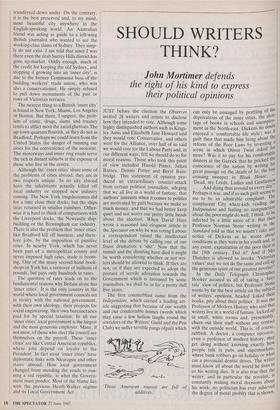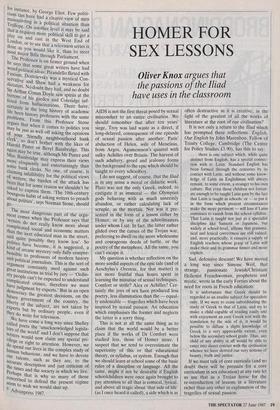SHOULD WRITERS THINK?
John Mortimer defends the right of his kind to express their political opinions
JUST before the election the Observer invited 28 writers and artists to disclose how they intended to vote. Although some highly distinguished authors such as Kings- ley Amis and Elizabeth Jane Howard said they would vote Conservative, and others were for the Alliance, over half of us said we would vote for the Labour Party and, in our different ways, felt we should do so for moral reasons. Those who took this point of view included Harold Pinter, Julian Barnes, Dennis Potter and Beryl Bain- bridge. This statement of opinion pro- duced an extraordinary counter-attack from certain political journalists, alleging that we all live in a world of fantasy, that authors' interests when it comes to politics are motivated by guilt because we make so much money, and that we had better keep quiet and not worry our pretty little heads about the election. When David Hare wrote a reasoned and eloquent article in the Spectator on why he was voting Labour a correspondent raised the intellectual level of the debate by calling one of our finest dramatists a 'shit'. Now that the tumult and the shouting have died it might be worth considering whether or not wri- ters should be allowed to think. If they are not, or if they are expected to adopt the posture of servile adoration towards the Government which is favoured by some journalists, we shall be in for a pretty dull five years.
The first counterblast came from the Independent, which carried a leading art- icle suggesting that because of our wealth and our comfortable homes (words which may raise a few hollow laughs round the corridors of the Writers' Guild and the Pen Club) we suffer terrible pangs ofguilt which 'Those American tourists are full of additives.' can only be assuaged by prattling of the deprivations of the inner cities, the shor- tage of books in schools and unemploy- ment in the North-east. Dickens no doubt enjoyed a 'comfortable life style'; was it guilt then that made him bring about the reform of the Poor Laws by inventing a scene in which Oliver Twist asked for more? Was it to pay for his comfortable dinners at the Garrick that he pricked the conscience of the nation bywriting his great passage on the death of Jo, the boy crossing sweeper in Bleak House, — 'Dead, my Lords, Ladies and Gentlemen . . . And dying thus around us every day ? Perhaps it was, and if so such guilt seems to me to be an admirable complaint. The complacent City whizz-kids reading the Independent and feeling no compunction about the poor might do well, I think, to be infected by a little more of it. But then Professor Norman Stone writing in the Standard told us that we mustn't take any notice of Dickens as he wrote about conditions as they were in his youth and, in any event, exploitation of the poor died in the 19th century. Did it? And if Mrs Thatcher is allowed to invoke 'Victorian values' may we not do the same and call up the generous spirit of our greatest novelist? In the Daily Telegraph Christopher Booker accused us all of taking a 'fairy tale' view of politics; but Professor Stone wrote by far the best article on the subject of writers' opinions, headed 'Liked their books, pity about their politics'. It was the Professor of Modern History who said that writers live in a world of fantasy, locked up in small, white rooms and, presumably, churn out their stuff without any contact with the outside world. This is, of course, rubbish. A doctor, a computer operator, even a professor of modern history, may get along without knowing exactly how people talk in pubs and supermarkets, where bank robbers go on holiday or what car a provincial dentist drives. The writer must know all about the world he lives in or his writing dies. It is also true that the writer, and in particular the novelist, is constantly making moral decisions about his work: no politician has ever achieved the degree of moral probity that is shown,
for instance, by George Eliot. Few politi- cians can have had a clearer view of men
manoeuvring in a political situation than Trollope. On another level it may be said
that it requires more political skill to get a play on and cast in the West End of London, or to see that a television series is done as you would like it, than to steer most major Bills through Parliament. The Professor is on firmer ground when he says that some great writers have had weird political ideas: Pirandello flirted with Fascism, Dostoievsky was a mystical Con- servative and Shaw had a weakness for dictators. No doubt they had, and no doubt Sir Arthur Conan Doyle saw spirits at the bottom of his garden and Coleridge suf- fered from hallucinations. There have, certainly in the long history of academic life been history professors with the same problems. From this Professor Stone argues that when it comes to politics you may be just as well off asking the opinions of Your 'friendly neighbourhood bank clerk', so don't bother with the likes of Harold Pinter or Beryl Bainbridge. This again may be true, although Mr Pinter and
Miss Bainbridge may express their views more eloquently and entertainingly than
some bank clerks. No one, of course, is claiming infallibility for the political views of writers; the burden of the attack has been that for some reason we shouldn't be asked to express them. The 19th-century bourgeois habit of asking writers to preach gabo.out politics', says Norman Stone, should The most dangerous part of the argu- ment comes when the Professor says that `writers do not really know more about complicated social and economic matters than the next educated man in the street, and quite possibly they know less'. So Politics have become, it is suggested, a kind of arcane mystery only fully compre- hensible to professors of modern history and political journalists. This is the sort of
argument constantly used, against such great institutions as trial by jury — 'Ordin- ary people can't be expected to understand complicated crimes, therefore we must have judgment by experts.' But in an open democracy the greatest decisions, on the future government of the country, the liberty of the subject, are not taken by experts but by ordinary people, even if they do write for television.
We have come a long way since Shelley poets the 'unacknowledged legisla- tarsoof the world' and I don't suppose that writers would now claim any special pri- vilege or right to attention. However, we
do spend our lives in the complex study of human behaviour, and we have to devote our talents, such as they are, to the accurate description and just criticism of the times and the society in which we live. Perhaps that is why so many of those concerned to defend the present regime seem to wish we would shut up. Advanpress 1987.










































































 Previous page
Previous page